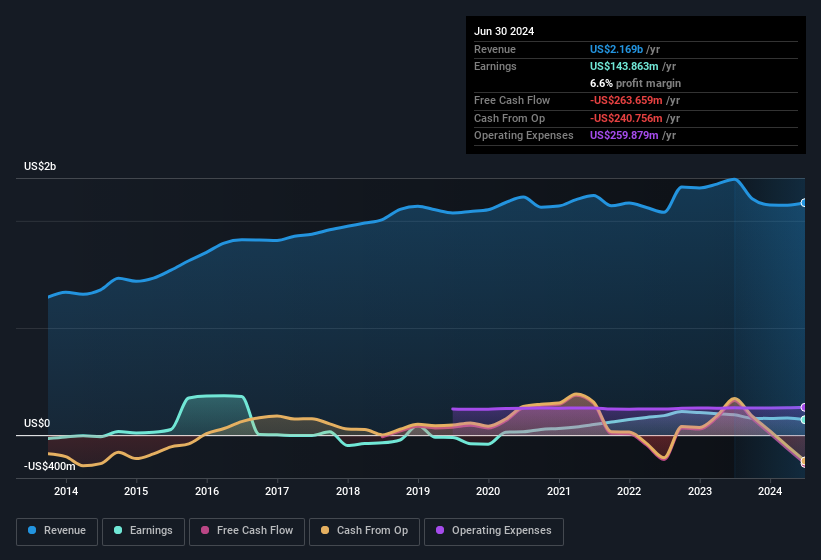- United States
- /
- Consumer Durables
- /
- NYSE:BZH
Earnings Troubles May Signal Larger Issues for Beazer Homes USA (NYSE:BZH) Shareholders

Investors were disappointed by Beazer Homes USA, Inc.'s (NYSE:BZH ) latest earnings release. We did some analysis, and found that there are some reasons to be cautious about the headline numbers.
View our latest analysis for Beazer Homes USA

Examining Cashflow Against Beazer Homes USA's Earnings
As finance nerds would already know, the accrual ratio from cashflow is a key measure for assessing how well a company's free cash flow (FCF) matches its profit. In plain english, this ratio subtracts FCF from net profit, and divides that number by the company's average operating assets over that period. This ratio tells us how much of a company's profit is not backed by free cashflow.
As a result, a negative accrual ratio is a positive for the company, and a positive accrual ratio is a negative. While having an accrual ratio above zero is of little concern, we do think it's worth noting when a company has a relatively high accrual ratio. Notably, there is some academic evidence that suggests that a high accrual ratio is a bad sign for near-term profits, generally speaking.
For the year to June 2024, Beazer Homes USA had an accrual ratio of 0.21. We can therefore deduce that its free cash flow fell well short of covering its statutory profit. Even though it reported a profit of US$143.9m, a look at free cash flow indicates it actually burnt through US$264m in the last year. We saw that FCF was US$323m a year ago though, so Beazer Homes USA has at least been able to generate positive FCF in the past. The good news for shareholders is that Beazer Homes USA's accrual ratio was much better last year, so this year's poor reading might simply be a case of a short term mismatch between profit and FCF. As a result, some shareholders may be looking for stronger cash conversion in the current year.
That might leave you wondering what analysts are forecasting in terms of future profitability. Luckily, you can click here to see an interactive graph depicting future profitability, based on their estimates.
Our Take On Beazer Homes USA's Profit Performance
Beazer Homes USA's accrual ratio for the last twelve months signifies cash conversion is less than ideal, which is a negative when it comes to our view of its earnings. Because of this, we think that it may be that Beazer Homes USA's statutory profits are better than its underlying earnings power. Nonetheless, it's still worth noting that its earnings per share have grown at 43% over the last three years. At the end of the day, it's essential to consider more than just the factors above, if you want to understand the company properly. If you want to do dive deeper into Beazer Homes USA, you'd also look into what risks it is currently facing. For example, we've discovered 2 warning signs that you should run your eye over to get a better picture of Beazer Homes USA.
This note has only looked at a single factor that sheds light on the nature of Beazer Homes USA's profit. But there are plenty of other ways to inform your opinion of a company. Some people consider a high return on equity to be a good sign of a quality business. So you may wish to see this free collection of companies boasting high return on equity, or this list of stocks with high insider ownership.
Valuation is complex, but we're here to simplify it.
Discover if Beazer Homes USA might be undervalued or overvalued with our detailed analysis, featuring fair value estimates, potential risks, dividends, insider trades, and its financial condition.
Access Free AnalysisHave feedback on this article? Concerned about the content? Get in touch with us directly. Alternatively, email editorial-team (at) simplywallst.com.
This article by Simply Wall St is general in nature. We provide commentary based on historical data and analyst forecasts only using an unbiased methodology and our articles are not intended to be financial advice. It does not constitute a recommendation to buy or sell any stock, and does not take account of your objectives, or your financial situation. We aim to bring you long-term focused analysis driven by fundamental data. Note that our analysis may not factor in the latest price-sensitive company announcements or qualitative material. Simply Wall St has no position in any stocks mentioned.
About NYSE:BZH
Very undervalued with moderate growth potential.


